Highlights
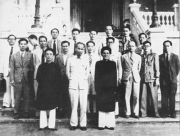
Huynh Thuc Khang: The political portrait of an intellectual
(LLCT) - On the occasion of the 140th birth anniversary of Huynh Thuc Khang (1876 - 2016), this article, from a historical perspective, means to further clarify his political portrait as a person, a thinker and an activist by studying his contribution to the national struggle for independence in the 20th century.
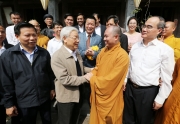
Promoting great national unity, and successfully building and firmly safeguarding the Fatherland in the present context
(LLCT) - Great national unity is always a matter of strategic importance, a consistent way of thinking and a common thread running through the Party leadership on the country’s revolutions. Continuing the implementation of the “great national unity” policy, given the current globalization and international integration, the Party’s 12th Congress pointed out, “Great national unity is a strategic policy and a major source of inspiration and resource for national building and protection”(1).
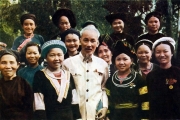
Ho Chi Minh’s philosophy of social progress and its significance to awareness of developmental goals in Vietnam
(LLCT) - Ho Chi Minh’s views on social progress are of philosophical importance because they are a set of ideas combining Marxist philosophy of social progress and experience in actual Vietnamese revolutionary activities and the world’s views on social progress together. By acquiring the world views and methodologies of Marxist philosophy, Ho Chi Minh pointed out the role of the masses in the historical development of the society, thereby establishing goals for the Vietnamese revolution.
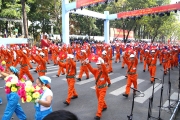
Upholding the CPV’s working-class nature in new contexts
(LLCT) - The working-class nature of the Party is manifested in the fact that its objectives and ideals are socialism and communism; that its ideological foundation is Marxism - Leninism and Ho Chi Minh Thought; that its fundamental organizational principle is centralized democracy; that it is in close touch with the masses; and that it considers criticism and self-criticism to be its developmental law.
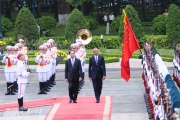
Vietnam - U.S. cooperation in national defense and resolving “Legacy of the Vietnam War” since 1995
(LLCT) - After 20 years of normalized relations, Vietnam and the U.S. have become “friends” and, since 2013, comprehensive partners. Despite the deliberate rate of development, this bilateral cooperation has made firm steps and has been expanded and prospered in many aspects, including cooperation in national defense resources and remediation of the effects of the Vietnam War.
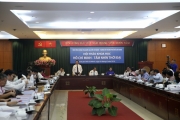
Ho Chi Minh - A statesman of great vision
(LLCT) - In celebration of the 105th anniversary of the day Ho Chi Minh left Vietnam to seek ways for national salvation (5 June 1911 - 5 June 2016), Ho Chi Minh National Academy of Politics in coordination with the Ho Chi Minh City Party Committee organized the symposium “Ho Chi Minh - A statesman of great vision” in Ho Chi Minh City. The Journal would like to publish extracts of the keynote speech by Professor and Doctor Nguyen Xuan Thang, Member of the Party Central Committee, and Secretary of the Party Committee and President of the Ho Chi Minh National Academy of Politics.
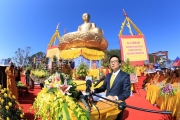
Religious policies in the socialist law-ruled State of Vietnam
(LLCT) - Do religions have a place in the law-ruled state? In Vietnam, for religions and the socialist law-ruled State get on with each other and conform to the United Nations’ declarations on human and civil rights, how should the State implement its religious policies? The following article answers these questions.
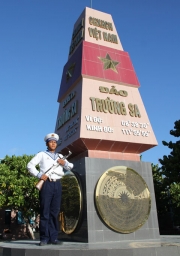
The 1958 Diplomatic Note of Prime Minister Pham Van Dong and Vietnam’s sovereignty over the Hoang Sa and Truong Sa Archipelagos
(LLCT) - Numerous articles have been published that discuss the legality of the contents in PM Pham Van Dong’s 1958 Diplomatic Note and the evidence provided by China. This article, referring to a number of works conducted by domestic and foreign researchers, attempts to analyze the legality of PM Pham Van Dong’s Diplomatic Note in the hope of asserting that the document has a common diplomatic nature, showing the socialist system’s solidarity against US invasions during the early stages of the Cold War. Thus, it does not exert any impact on Vietnam’s legitimate sovereignty over the Hoang Sa and Truong Sa Archipelagos.
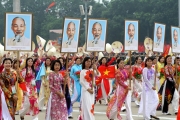
Gender dimensions in the current institutions and policies for female intellectuals
(LLCT) - The Communist Party of Vietnam always attaches great importance to the advancement of intellectuals, including female ones. In this article, female intellectuals include those who graduated from colleges and universities, now working in the fields of social sciences and humanities, science and technology, health care, education and training, literature, arts, or holding leadership and management positions.

Characteristics of Vietnamese culture
(LLCT) - The historical activity of human society conforms to the nature of culture, lending it the qualities and functions of productive forces. Therefore, culture has a direct influence on nature and socio-economic building and development.
Journal Archives
Journal Archives
Media
Photo Gallery
Contact us

 Last highlights
Last highlights


